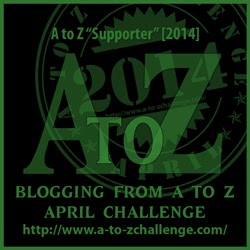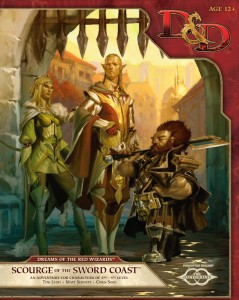 It’s that time of year again; time for the Blogging from A to Z Challenge. The challenge is to write a new article ever day in April, excluding Sundays. That’s 26 articles over the course of the month. To make things even more interesting the title or theme of each article will begin with a different letter of the alphabet. So on April 1 the article will begins with A, on April 2 it will begin with B, and so on all the way to the Z article on April 30.
It’s that time of year again; time for the Blogging from A to Z Challenge. The challenge is to write a new article ever day in April, excluding Sundays. That’s 26 articles over the course of the month. To make things even more interesting the title or theme of each article will begin with a different letter of the alphabet. So on April 1 the article will begins with A, on April 2 it will begin with B, and so on all the way to the Z article on April 30.
Tag: Dungeons and Dragons
On Friday we comb through our extensive archives to find an older article that we feel deserves another look. From March 29, 2011, Dungeon’s Master once again presents: Casting Raise Dead.
What happens when you cast the raise dead ritual?
While Raise Dead is only a level 8 ritual, I would argue that it is one of the most powerful rituals in 4e Dungeons & Dragons. The ability to return a soul to its body is awesome and is a power beyond the understanding of most people.
This month (March 2011) the RPG Blog Carnival is hosted by Campaign Mastery and the focus is on Life and Death in RPGs. At Dungeon’s Master our contribution to this discussion will focus on the implications of casting the Raise Dead ritual.
All societies have grappled with the question of what happens beyond life. In a society where the ability to raise the dead exists, the question becomes what does it take to bring a soul back and restore the body to life? What toll is imposed on the caster of such a spell? What is involved in casting such a ritual?
 We ended week 4 with the party exploring the subterranean area beneath Julkoun. Regrettably I was unable to participate in the week 5 session, but the game went on without me. So in this week’s blog post I’ll do my best to quickly recap what happened while I was away and the move on to the details of what happened this week.
We ended week 4 with the party exploring the subterranean area beneath Julkoun. Regrettably I was unable to participate in the week 5 session, but the game went on without me. So in this week’s blog post I’ll do my best to quickly recap what happened while I was away and the move on to the details of what happened this week.
We’re still running four tables at Hairy T North in Toronto. The other two tables (one 4e and one D&D Next) have been full with six players at each most weeks. Craig and I continue to see the numbers at our combined tables dwindle. Last week Craig ran both groups together but only had eight players. This week we again had eight players but with two DMs. I’m not sure why we’ve lost so many of our regulars. Although we have had a few walk-ins this season, only one has stuck around. Two of the players at my table already told me they’ll be absent during the next few sessions so our super table may be down to a single table before the season ends.
This week the party ended up with the following members present: Half-Orc Mage, Half-Orc Paladin, Half-Orc Cleric, Elf Ranger, Elf Cleric/Rogue, Gnome Druid, Halfling Rogue, and Drow Paladin.
On Friday we comb through our extensive archives to find an older article that we feel deserves another look. From March 21, 2011, Dungeon’s Master once again presents: The Importance of Trust and Honesty in D&D.
I think that the vast majority of people who play D&D take for granted just how important trust and honesty are to the game. In order for everything to work we have to assume that everyone playing is honest and trustworthy. Of course, we don’t come right out and ask this of the other players; you merely accept it as fact. If players cheat or abuse the trust we’ve given them in good faith, then the system won’t work and the gaming experience will be tarnished.
Just this past weekend I was playing a Living Forgotten Realms (LFR) adventure at my FLGS and something happened that really highlighted the importance of trust in D&D. It was an unusual situation, and the more I thought about it the more I realized that perhaps it’s time to discuss just how vital trust and honesty are in D&D.
 Sent to Julkoun by Duke Daggerford to investigate a missing shipment of goods and the strange appearance of a dozen messenger pigeons with no messages, the PCs found Goblins manning the guard towers and no evidence of the townsfolk dead or alive. During last week’s session the PCs got inside the walled village, killed all the Goblins in the towers, and defeated six Bugbears. Now they proceeded into the underground sections of the village: the Warehouse Basement and the subterranean inn & tavern, Jester’s Pride.
Sent to Julkoun by Duke Daggerford to investigate a missing shipment of goods and the strange appearance of a dozen messenger pigeons with no messages, the PCs found Goblins manning the guard towers and no evidence of the townsfolk dead or alive. During last week’s session the PCs got inside the walled village, killed all the Goblins in the towers, and defeated six Bugbears. Now they proceeded into the underground sections of the village: the Warehouse Basement and the subterranean inn & tavern, Jester’s Pride.
We’ve seen a steady decline in our numbers over the past few weeks at Harry T North in Toronto. The 4e table is holding strong with six players and the other D&D Next table was down to five this week. The double group that Craig and I are running started with 12 players in week 1 and was down to only six of our regulars and two new players this week.
Both new players decided to play Clerics making the party composition look like this: Halfling Rogue, Human Cleric, Drow Paladin, Half-Orc Mage, Half-Orc Paladin, Elf Ranger, Human Cleric, and Elf Cleric/Rogue.
My group, the Half-Orc Mage, Half-Orc Paladin, Elf Ranger, and Human Cleric were inside the Warehouse. The other group, the Halfling Rogue, Human Cleric, and Drow Paladin were about to enter the Jester’s Pride. The Elf Cleric/Rogue was still in the guard tower waiting and watching while the rest of the PCs continued their searching.
 One thing we decided when long ago was that we wouldn’t post new classes, feats, powers, or that kind of thing here at Dungeon’s Master. Since most players use Character Builder to create their characters it seemed like a waste of time to post any home brew material since we knew there was little chance of anyone actually using it in their game. However, as we transition to D&D Next we return to a system that a) doesn’t have character builder, and b) encourages players to be wildly imaginative when they’re creating characters.
One thing we decided when long ago was that we wouldn’t post new classes, feats, powers, or that kind of thing here at Dungeon’s Master. Since most players use Character Builder to create their characters it seemed like a waste of time to post any home brew material since we knew there was little chance of anyone actually using it in their game. However, as we transition to D&D Next we return to a system that a) doesn’t have character builder, and b) encourages players to be wildly imaginative when they’re creating characters.
This doesn’t mean that we’re planning to post a whole bunch of home brew material like new classes, items, or spells, but we are going to be more open to the possibility of such articles.
Last week as I was browsing the D&D sub-Reddit I stumbled upon a really creative take on the Bard class for D&D Next. I reached out to the author (/u/MightyWarWren) and asked him if we could post his version of the Bard here at Dungeon’s Master in order to give it more exposure. He agreed.
On Friday we comb through our extensive archives to find an older article that we feel deserves another look. From February 19, 2009, Dungeon’s Master once again presents: Adjudicating and House Rules.
DM – The bugbear sneaks up behind Ethan the Rogue and strangles him with a garrote. You’re immobilized until you make a successful escape check.
Nenia – I attack the Bugbear with a Magic Missile and use my Orb of Unlucky Exchanges to switch the immobilized condition from Ethan to the Bugbear.
DM – Wait a minute, you mean the garrote magically goes from around Ethan’s neck to around the Bugbear’s own neck? That doesn’t seem right.
Nenia – That’s right and if the Bugbear wants to free himself he needs to make an escape check.
DM – Against himself?! That definitely doesn’t sound right.
What happens when a situation comes up and you as the DM don’t know what to do? Generally it’s one of two things: 1) you know there’s a rule that will solve the dilemma but you can’t find it, or 2) the situation is so unprecedented that you never thought of how to handle it. As the DM, what do you do?
 So far this season the PCs have spent all their time in Daggerford exploring the town, getting to know the locals, and discovering rumours. By the end of the last session they’d met with Duke Daggerford himself and agreed to head to the nearby village of Julkoun to investigate the missing shipment of good and absence of travelers or messages from Julkoun. When we picked things up this week, a few days in game had passed and the party could see Julkoun in the distance as the approached by boat.
So far this season the PCs have spent all their time in Daggerford exploring the town, getting to know the locals, and discovering rumours. By the end of the last session they’d met with Duke Daggerford himself and agreed to head to the nearby village of Julkoun to investigate the missing shipment of good and absence of travelers or messages from Julkoun. When we picked things up this week, a few days in game had passed and the party could see Julkoun in the distance as the approached by boat.
At Harry T North in Toronto we ran four tables this week, one using 4e and the other three using D&D Next. All told we had 21 players. Many of our regulars were absent this week but we did have two brand new players join in the fun: one with zero D&D experience, and one who hadn’t played since 3e.
The combined two-table group that Craig and I are running cooperatively had nine players this week. Even though the players were technically sitting at two different tables the story required that the parties be together at the outset. The group consisted of the following PCs: Halfling Rogue, Gnome Druid, Tiefling Rogue, Drow Paladin, Half-Orc Mage, Half-Orc Paladin, Elf Ranger, Human Monk, and Elf Cleric/Rogue.
Gaming Resume
It’s fair to say I was a decent athlete in my teenage years, but I was never the best player on the team. Growing up, I knew that there was no way I’d ever play sports professionally. However, as a gaming nerd, I’ve always thought it might be possible to get a job in the RPG industry, or specifically to get the chance to work for Wizards of the Coast.
A couple of years ago I got the chance to write some articles for Wizards as a freelancer, and that certainly got me a bit closer to living the dream. Last week I applied for a contract position with Wizards of the Coast as one of three D&D Organized Play Administrators. It’s not a full time job, but it’s a chance to make a meaningful contribution to the game I love and the public play program that I participate in every week.
On Friday we comb through our extensive archives to find an older article that we feel deserves another look. From July 25, 2012, Dungeon’s Master once again presents: Only Ten – Ameron’s List.
“If you could only keep ten of your printed RPG books, which would you pick?”
This is the question Brendan from the gaming blog Untimately asked on Monday. He then proceeded to share his ten. Many of his readers shared their list in the comments section of the original post and I’ve seen more than a few bloggers post their essential ten list around the blogosphere. Today it’s my turn to join in this show and tell exercise and share my list.
Yesterday I looked around my gaming room to try to narrow it down to just ten books. After giving it some consideration I finally narrowed it down to just ten (which was a lot harder than I thought it would be). I’ve actually cheated in a few instances and grouped a few books together as one entry, but the reasons will be apparent as you read through my list.
You’ll notice the absence of any PHB, DMG and MM from my list. This was a deliberate choice. In my opinion some iteration of these books should be on everyone’s list; after all they’re called core books for a reason. I approached this task with the assumption that the core books were a given and these were the next ten I’d choose after those.
Rather than struggle with ranking, I decided instead to list the books alphabetically. I want you to see my list as a collection. Theses all made my list and that’s all that should matter, not which one is more important or useful that the next.